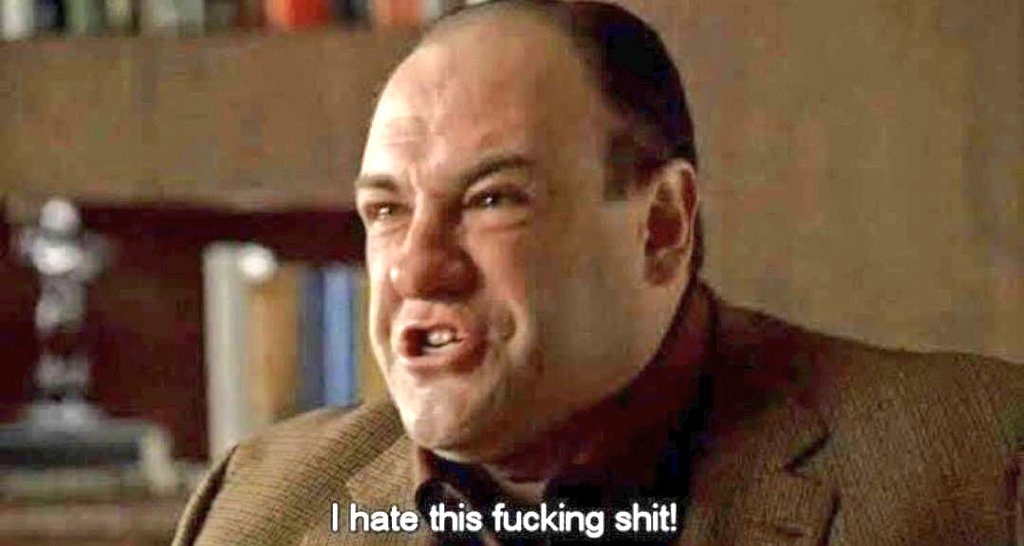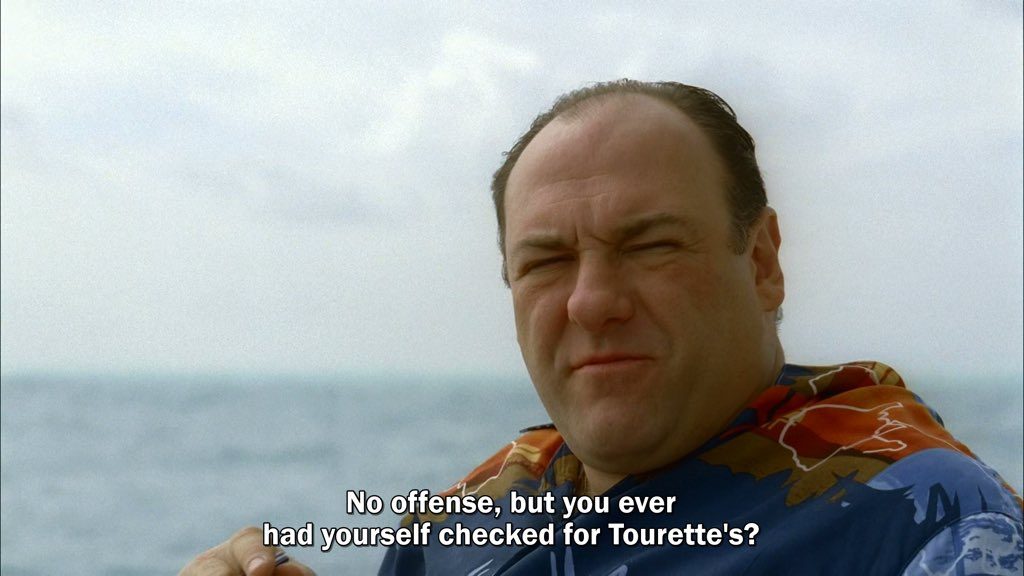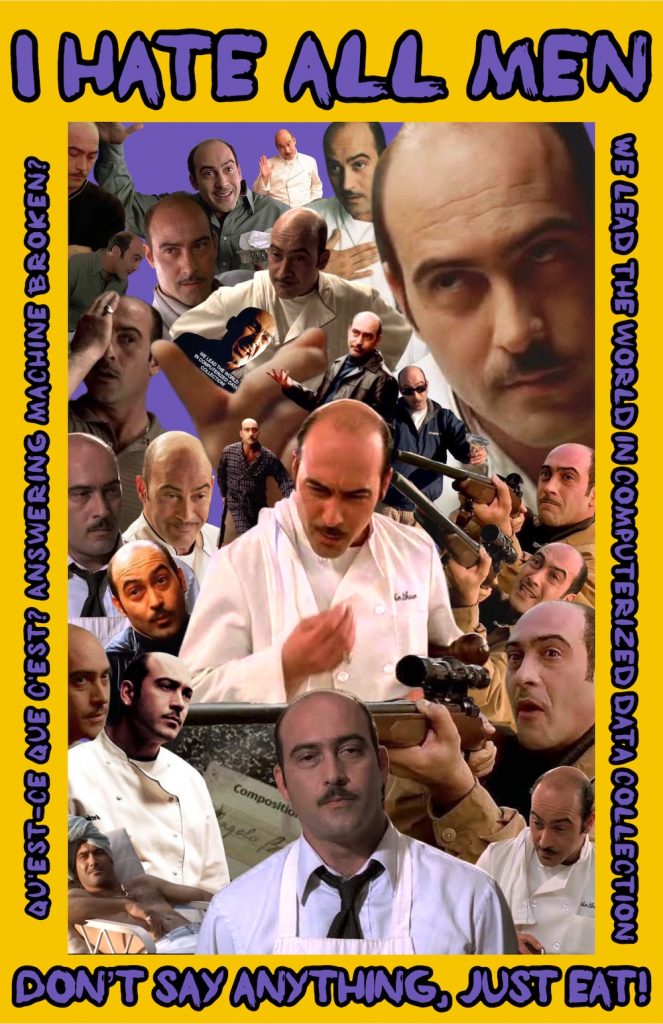How ‘The Sopranos’, Isolation, And My Autism Undid My Masking
The stresses and pressures of the pandemic have thrown my carefully curated habits out the window - and I don't want them to return.

Last year, I found myself communicating solely in Sopranos memes.
With friends, family, my partner, even in work emails, no words could match a screen-cap of Tony Soprano screaming “I hate this fucking shit!” when it came to communicating how I was going. No hand-wringing Twitter thread could capture the agony of the pandemic like a nine-second clip of Christopher Moltinsanti saying “It’s like the fuckin’ regularness of life is too fuckin’ hard for me.”
Language had left me. Like everyone else, I was burnt out on horror and heartbreak. I was sliding down a chute of grief like the off-cuts at a slaughterhouse, anything worth saving sieved into a bucket of slop labelled “Patrick M. 2020.”
The only thing keeping me connected to anything at all was The Sopranos, Sopranos trivia, and Sopranos memes — it was like a gabagool lifesaver thrown to me when I was drowning in an ocean of my dead and dying futures.

Obsession, Obsession, Obsession
As someone on the autism spectrum, obsession is a foundational cornerstone of who I am, and how I work. Be it dinosaurs, Pokémon, Lord of the Rings, pre-war blues music, Akira Kurosawa, Evel Knievel, or The Sopranos, obsession has always been the key to unlocking myself, and my means of unlocking others.
It has also, naturally, bonded me to my fellow autistics. Obsessions are beacons helping us find each other in the dark, in the chatroom, or at Games Workshop. Obsessions fuel us, and give us something to latch onto as we’re swept out by the tide of commonality and eye-contact that is the neurotypical world. As much as they can hinder our social graces (sorry if I chewed your ear off about Evel Knievel’s Snake River jump in 2018), they also help us assimilate, working as a quirk (and I mean ‘quirk’ in the anime sense) in how they lend us value as a specialist in this or that, allowing us to be wheeled out like stimming King Kong’s at dinner parties and festival panels and the likes for the regular folk to applaud or jeer.
Obsessions are beacons helping us find each other in the dark, in the chatroom, or at Games Workshop.
You can be consumed by an obsession. Warped by it. I’m not referring to phenomena like toxic fandom or starting a podcast, but instead to the way in which an obsession can take your hand and lead you further inwards, supplanting your need for contact, relationships, or community.
A conversation that I’ve been having with a lot of other friends on the spectrum this past year is that we’ve found ourselves becoming “more” autistic. It’s as though someone has greased up the spectrum (which I’ve always pictured as a kinda see-saw cross fireman’s pole) and we’re all sliding down it into the danger zone labelled “full r-word.”
For me, this has manifested in various ways. I found myself stimming like I hadn’t in ages, bobbing and weaving in conversations like a shadow boxer, rocking back and forth like one of those drinking bird toys, and pulling various silly grimaces and winks at whoever I was trying to talk to over coffee. My ‘songs’ came back, they being a non-stop spew of silly ditties that come out of my mouth fully formed lyrically and melodically, usually pertaining to something crass (have been on a real “shidding and farding” period, of late), and so persistent as to become white noise to a partner or patient dog.
On the more dire end of the scale, I found my long fought for patience evaporate and my ability/willingness to connect with others go up in smoke. The unceasing sense of being too overwhelmed to think or act enveloped me. Small decisions became insurmountable tasks, kicked and kicked again down the road of my own paralysis, until the thing they concerned rolled down the drain into the gutter of missed opportunity with all the other lame turds.
I receded inwards, shrivelling up like a dry riverbed. It was as though I was dying of thirst, and the closest thing I could get to cool water was Tony Soprano, standing in his pool, waving at ducks.
Stripping Away Pretence And Patience
It’s odd to be able to notice this happening to yourself. The stresses and harries of the pandemic has stripped away pretence and patience for the commoners (what I call neurotypicals), who have found themselves, dare I say it, acting a bit like us, or at least dipping their toes in the kiddy pool.
For those of us who were already swimming laps, the last year has knocked us into a bizarre nether-zone, where the carefully accrued habits and graces we’ve cultivated to craft a mask of worthiness have left said mask cracked and slipping, with our distant smirks peeping through.
For those not in the know, high functioning autistics like myself pull off a daily magic trick called “masking” where we hide our autistic selves away so as not to confront the commoners with our uniqueness. It’s a fairly exhausting business that operates on multiple levels, masks being worn for different folks of different strokes (and HR departments) on different occasions, causing us to regulate ourselves in response to an ever-fluctuating Geiger counter which scans the room for “regularness” and “permission.”
I am at my most autistic self with long-term partners (the guilt around this is a whole other conversation), and I’m my most “normie” around my second favourite barista’s girlfriend Alyssa, who teaches water aerobics, or my friend’s WASP uncle who called me “retardo”, and those like them. It is an exhausting game of three-card monte that you play to con yourself into believing that you deserve to be conned into being a way that you, quite literally, can not be.
So last year, myself and other autistics I know found ourselves going full mask-off in private and in public for the first time in forever. Society all but collapsed, and with it went our need, or our ability, to mask. Old habits came roaring back, and so did that lonesome feeling that all folks on the spectrum get, that one that tells us our otherness is onlyness, and that it’s best if we hide ourselves away, lest we frighten the children or a prospective employer.
So a lot of us did just that. Now that we are (or were) beginning to emerge, we’ve found ourselves more exposed than we’ve been since we learned how to cover ourselves up in our teens. Everyone has lost friendships in the past year, everyone is finding it hard to reach out right now, but for those of us who have always found it difficult, or were discouraged from doing so because we could not do it within the boundaries of permissible sanity, the act of reconnecting is feeling all but impossible.

For me, I plummeted back into The Sopranos. Rewatching it, I felt a great catharsis. In its depiction of emotionally juvenile weirdos who are only able to function within the constraints of a narrow world of rules and habits that they’ve constructed to survive the ‘acceptable’ world and to indulge in their obsessions and compulsions without guilt or judgment, no matter how destructive they are, The Sopranos may accidentally be the greatest autistic text ever created.
Most high-functioning autistics are mimics as a matter of survival. A large part of ‘masking’ is mastering the qualities that can help you pass as regular. I’ve always been an adept mimic, which is why I think so many who are close but not intimately close with me are surprised when they discover I’m on the spectrum. I am (or really, I was) a fairly garrulous charmer who can work a crowd of people like a used car salesman running for mayor in a one-horse town. But that requires fuel, and that fuel has always been cinema and TV for me — stitching together a patchwork scarecrow of yourself to ward off any thorough interrogation of your overall strangeness.
I think this system has hit a bit of a snag in my bulk Sopranos consumption. After a year with mostly Tony and co. for company, I can’t seem to turn it off. I’ve found myself unable to stop going “oooooooh, there he is!” any time someone I know enters a space, and my hand gestures are now at a frenetic nine on the Artie Bucco-meter. I also found myself making incredibly complex collages that made me stop and pause and go “by golly am I autistic” on more than one occasion. Every time I think I’m out, The Sopranos pull me back in, and I find my autistic self translated through and represented in the histrionics of Tony, the shrugging of Sil, or the repetitive tics and stimming of one Paulie Walnuts (who is, I’d argue, an autistic icon).
The Sopranos is, after all, a show about loneliness, and what we do to fill that loneliness within ourselves. Through Facebook groups and meme pages, I’ve found myself holding it out like an olive branch to neurotypical friends who watched it for the first time in isolation, its newfound virality working as a common thread to tie an anchor on and hurl overboard into normalcy.

One of said collages, by Patrick Marlborough.
Becoming An Anti-Masker
But I’ve now begun to ask myself if I really want to return to that ‘normalcy.’ Like Richie Aprille straight out of the can, I think the pandemic has maybe made me cooked in a way that can’t be uncooked. It has made me angry, which is peculiar to me as I’ve seldom been angry, genuinely, in my life. It has made me angry as an autistic and filled me with what I can only describe as autistic pride, that’s now bubbled over into rage.
After years of being scolded for being unable to maintain eye contact, I’m finally pointing my Manson lamps directly at neurotypical people, and I gotta say, it’s nice to them be the one’s that flinch for a change.
The pandemic has radicalised me. I have (buckle up) become a rabid anti-masker. I can’t put it back on for you people, for society, or for the ‘greater good.’ It is suffocating. As the wonks and politicians wring their hands and bullshit us about the need to return to normal, I find myself wanting to become wildly weirder. The genie is out of the bottle. I do not want to go back in.
I think the pandemic has maybe made me cooked in a way that can’t be uncooked.
I’m not sure the discourse around neurodiversity has changed much in the past year so much as neurodiverse people have changed. The ‘polite’ autistic imbecile and the eccentric bipolar maniac (also me, hello) aren’t operating within the comfortable bounds of tokenism anymore.
‘Neurodiversity’ has always had the hollow ring of a marketing term designed to help corporations meet quotas and gobble up grants. It is utterly shallow and meaningless in the way I witness it used in Australian media (and the arts) as a signifier of acceptable difference, a leash that allows us to be only so much, while we are wrung out for content and ‘conversation’ at the cost of our actual voices. You can be autistic, you can be mad, in your material, but never in your form. You can be autistic in translation — you codify and simplify it for us to help us accept you, to a point. Why would we continue with this exhausting minstrel act?
I am burnt out, and fed up of neurotypical people, attitudes, and society. I can’t see myself having the energy or the will to hide myself for them in the near or distant future. Autistics have afforded neurotypicals that politeness for too long only to be permitted to enter a prison of their design, and our making, with no allowance for complaint. Twenty years inside, not a fuckin’ peep, for what? To protect the likes of my barista’s girlfriend? My friend’s WASP uncle? The neurotypicals gave us shit the minute we got diagnosed. “Retardo,” that’s my legacy.
No more, Butchie. No more of this.
Patrick Marlborough is a writer, comedian, musician, and author based in Walyalup (Fremantle) Western Australia being barked at by their dog, Buckley.


